“There were balls of fire flying through the air”
Residents describe horror of perfect meteorological storm that caused huge blaze in Portugal
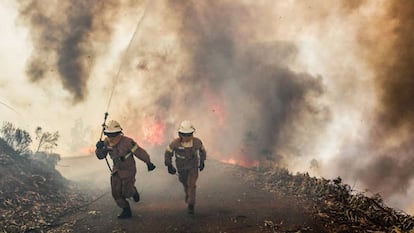
Two days after an intense forest fire in central Portugal that killed at least 64 people and injured 62 others, the skies over the tiny hamlet of Nodeirinho remain an ashen gray. But worst of all is the silence. There is nothing. There is no one. Up until last Saturday, this village had 50 residents. Now there are 11 fewer. Nodeirinho smells of smoke and death. Even the survivors have gone. All that remains are burned-out cars and closed doors.
On Saturday, balls of fire rained down on this place, as unusually high temperatures, extremely dry conditions and electrical storms combined to create a horror scenario in this forested region, which is popular with tourists.
Two brothers were separated by the fire. One survived but had to watch as his brother was burning in his car
Now, the only sign of life is a rose placed at the door of one of the burned-out cars. Three generations – a grandmother, her daughter and her granddaughter – were traveling in the vehicle. They thought it was better to try and flee the blaze. The flower is the only survivor.
The neighboring village of Figueira fared a little better – at least at first. Spared on Saturday, the residents on Sunday saw the flames swallow up their homes. “There were balls of fire flying and flying, and when they landed, things caught fire,” says Celeste, 80, who has spent her whole life in the village. “Some people thought it was better to get the car and leave but I thought that if the end of the world was coming, I wanted it to be in my house and with my possessions. I closed the windows and saved myself.”
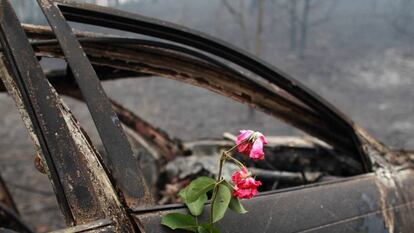
“Two brothers were separated by the fire,” says Antonia, 83, who has also spent her life in the village, and who has been left with burns on her arms from fighting the blaze. “One of them survived but had to watch on as his brother was burning in his car without being able to help him.”
Firefighters spent Monday morning hosing down the houses of Celeste, Antonia and fellow resident Laura. Avelino, the village’s barman, handed out food to the firefighters. His mother entered her smoke-filled house, now nothing but four walls. There is no electricity and the phone lines have been out for two days.
“I ate breakfast on Saturday but haven’t eaten since,” says Laura. “I am only drinking milk. I haven’t slept since everything started either.
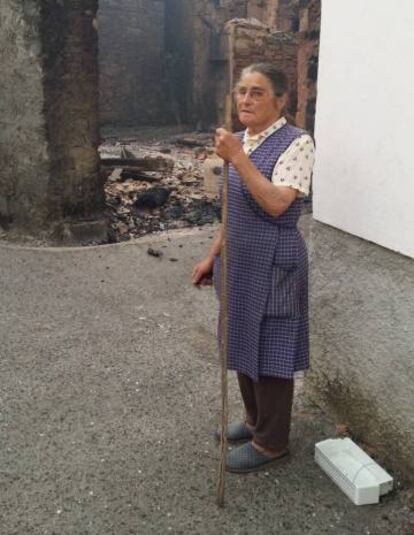
Drops of water are still falling on the village. “It’s the planes,” says Laura. But this time it is real rain: the firefighting aircraft can’t operate because of the columns of smoke.
Meanwhile, all the talk in Figueira and Pedrógão Grande, where people have remained, is of stories of survival: how a greyhound was saved, or the heroic firefighter who rescued a family by leading them through a tunnel of clear air in the middle of the fire. Then there is the village of Caniçal, where only one house has been left standing – the one with the swimming pool. The house in front of it and the house behind have been totally destroyed.
But the morning routine among the residents of Pedrógão Grande, Alvelas, Góis and Avelar hasn’t changed, with people asking: “All well?”
And this followed by the typical Portuguese response. “I’ve been worse.”
Powder keg
After last weekend’s blaze, Portuguese media outlets have been asking how it was possible that lightning strikes could have created such a violent fire, and how so many people could be caught unaware in their houses and cars.
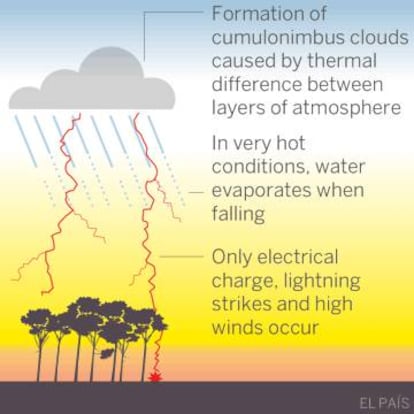
Among the causes pointed to are the “powder keg” nature of the forest of pines and eucalyptus in the zone, and the lack of coordination among emergency services. But there are still plenty of questions remaining as to why lightning strikes in a forested area – a not unusual occurrence in the Iberian peninsula in summer – could cause such an unusual and explosive blaze.
Experts consulted by EL PAÍS highlighted three main contributing factors. The first of those is the heat wave of the days beforehand, with temperatures up to 9ºC above average and very little rain, according to Ana Casals of Spain’s meteorological agency Aemet. This created the perfect conditions for storms.
Secondly, the difference between a hot surface temperature and the cold temperatures at high altitude led to the creation of the cumulonimbus clouds which bring summer storms, but not always rain. If the atmosphere is very dry the water evaporates before it even hits the ground. That can mean lightning strikes and strong winds, but no precipitation, as was the case here. This is particularly dangerous in forest zones, according to meteorologist Daniel Santos, pointing out that dry forest conditions “significantly raise the possibility of a fire.”
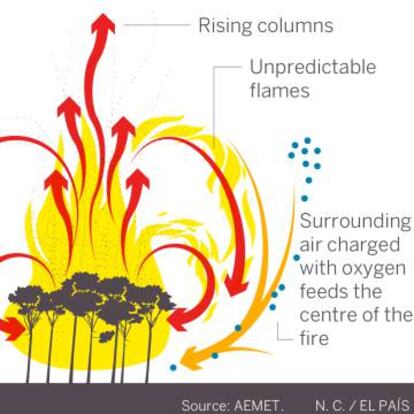
Thirdly, according to Ana Casals, when one or more bolts of lightning create fire under these circumstances, “the air that the flames heat up rises rapidly in a vertical manner and is replaced by the surrounding [colder] air, which brings oxygen and therefore adds extra ‘fuel’ for the fire.”
At the weekend, the dryness of the air and intense heat of the zone affected by the fire in Portugal meant this circular dynamic accelerated, creating violent eddies and swirls that made it impossible to predict the direction of the fire. This probably explains why several firefighters died when caught out by the swift advance of the blaze.
English version by George Mills.
Tu suscripción se está usando en otro dispositivo
¿Quieres añadir otro usuario a tu suscripción?
Si continúas leyendo en este dispositivo, no se podrá leer en el otro.
FlechaTu suscripción se está usando en otro dispositivo y solo puedes acceder a EL PAÍS desde un dispositivo a la vez.
Si quieres compartir tu cuenta, cambia tu suscripción a la modalidad Premium, así podrás añadir otro usuario. Cada uno accederá con su propia cuenta de email, lo que os permitirá personalizar vuestra experiencia en EL PAÍS.
¿Tienes una suscripción de empresa? Accede aquí para contratar más cuentas.
En el caso de no saber quién está usando tu cuenta, te recomendamos cambiar tu contraseña aquí.
Si decides continuar compartiendo tu cuenta, este mensaje se mostrará en tu dispositivo y en el de la otra persona que está usando tu cuenta de forma indefinida, afectando a tu experiencia de lectura. Puedes consultar aquí los términos y condiciones de la suscripción digital.








































